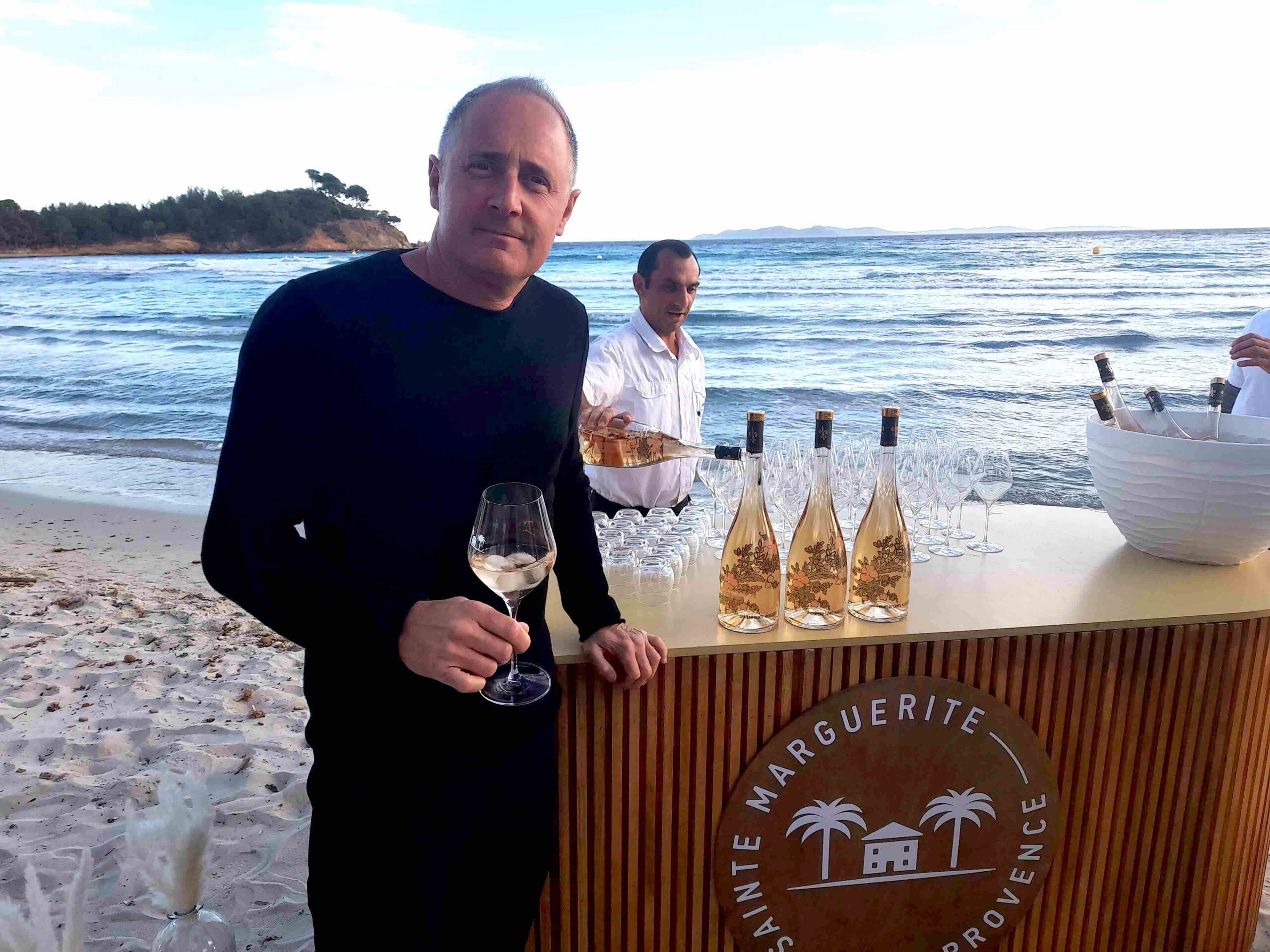“It’s the future style of Rosé,” Olivier Fayard declared of the Fantastique. “We aim for this ‘peau de pêche’ colour each time,” Enzo added.
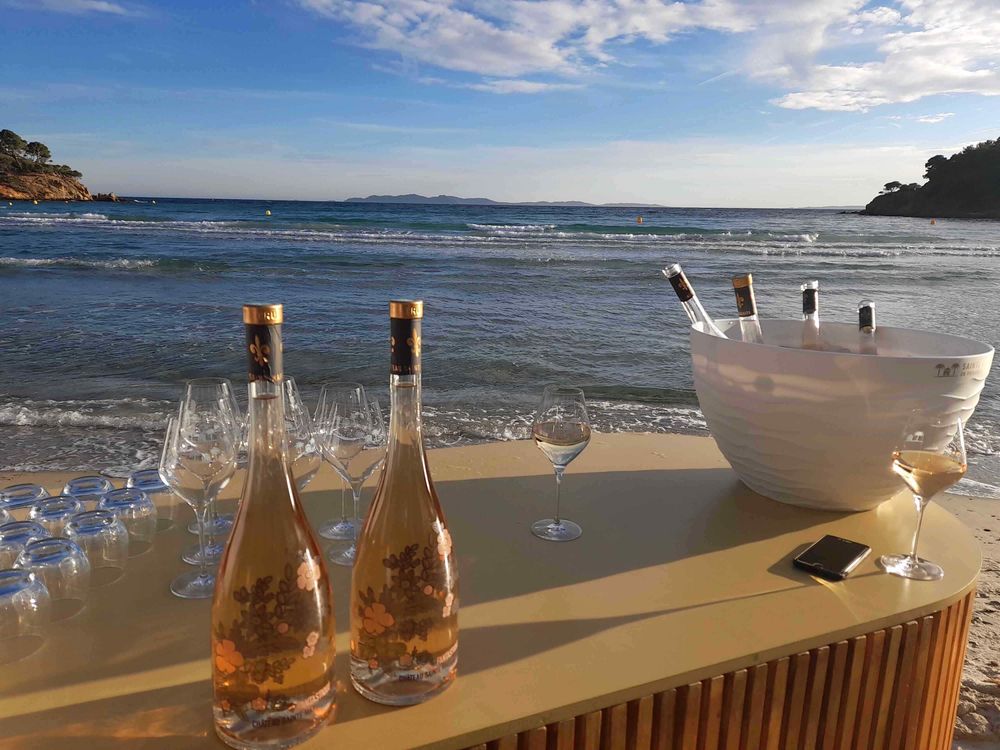
We spoke at Restaurant L’Estagnol, by the beautiful beach of the same name opposite Porquerolles, near Bormes-Les-Mimosas.
When Pernod Ricard bought a majority share in Château Sainte Marguerite last December, it confirmed the Provence winery’s place on the top table of French Rosé producers – one of only 18 cru classés in Côtes de Provence. Pernod Ricard, the world’s second biggest wines and spirits company, is notably selective with its acquisitions and the purchase was all about building its premium wine offering. Moreover, the French drinks giant’s extensive global distribution network will enable Château Sainte Marguerite to increase its current export levels of 20%.
With 200 organically-farmed hectares under vine in the Côtes de Provence appellation, Sainte Marguerite, which is a few kilometres outside the town of Hyères near Toulon, has some select parcels situated in the prestigious coastal terroir of La Londe. The soils there are predominantly schist, which is perfect for Rosé, with 3% clay and a bit of silex lower down at two metres depth.
These parcels overlook the four islands known as ‘Les Iles D’Or,’ one of which is the stunning tourist destination of Porquerolles, where vines are grown (although not by Château Sainte Marguerite). Given the high number of visitors that flock to the region every summer, the potential for wine tourism has not been lost on the Fayard brothers, co-owners of Château Sainte Marguerite, who have built a state-of-the-art visitor centre and cellar door.
Pernod Ricard’s message… quality first
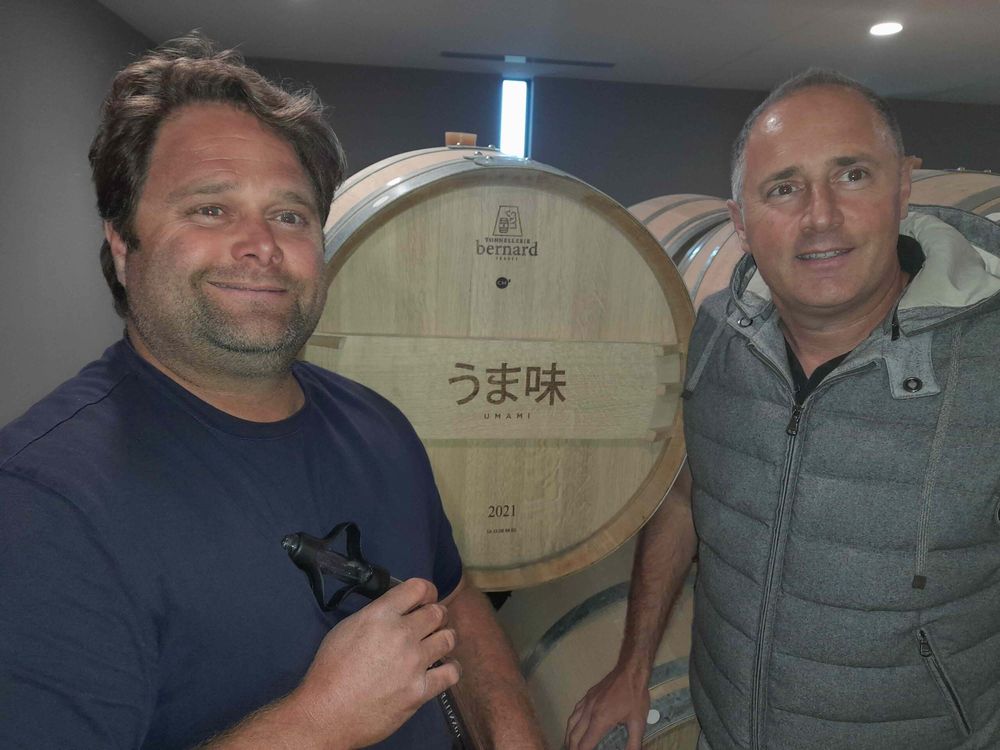
Enzo and Olivier Fayard (l-r) – dividing their priorities
It is the wines and their quality, though, that are the principal consideration for Olivier Fayard, the head winemaker and chief executive. Enzo Fayard, his younger sibling, is also involved with vinification but concentrates his energies on viticulture and vineyard management. They form a dynamic duo.
If increased demand requires Olivier to buy fruit in from other growers in the future, he will do so but only if it is organically-farmed and of requisite quality.
“I try to transform the attitude to organic farming in the region,” he said. “We have been certified organic since 2003. If I cannot find the quality, I will not buy. The first goal is the quality – every time quality. We have a deal with Pernod Ricard – continue to make this type of wine with passion: the very, very high quality wine. Quality first.”
It helps, no doubt, that Olivier is a good friend of Alexandre Ricard, the chairman and CEO of Pernod Ricard.
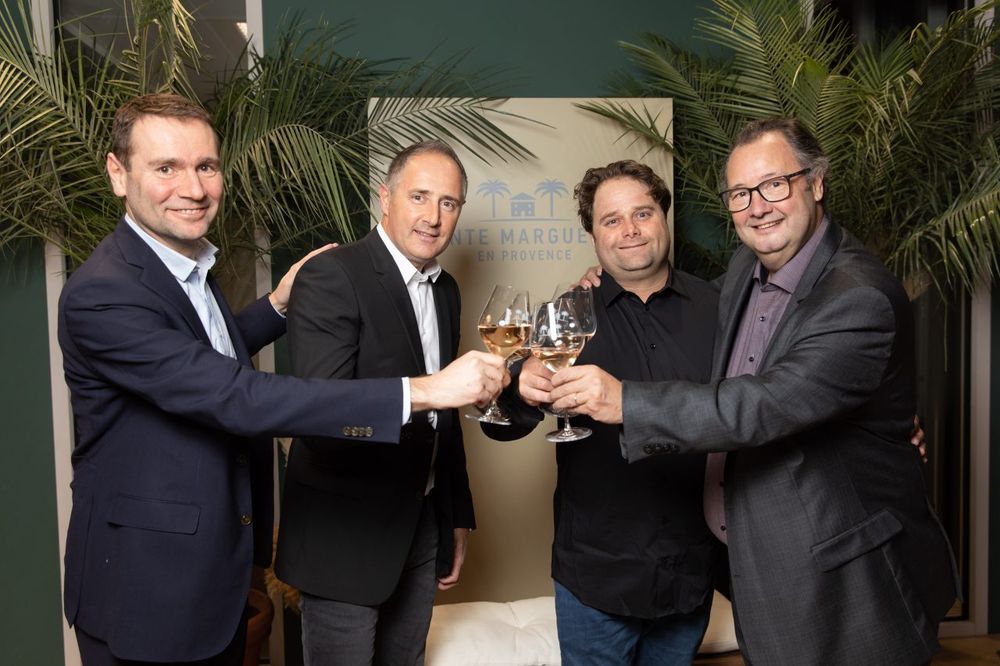
Sealing the deal: Alexandre Ricard, Olivier Fayard, Enzo Fayard, Cesar Giron (l-r) December 2022.
“I was with Alexandre and his wife and my wife last week at a party in Paris – just for fun because he’s my friend,” Olivier said, adding that he went on holiday with both Alexandre and his cousin, Cesar Giron, the CEO of Pernod Ricard’s two Champagne brands, Mumm and Perrier-Jouet. “It’s a family company, and a very good company, a humane company. For me, it’s easier because it’s a south French family like me. It’s easier to speak.”
Château Sainte Marguerite already exports to 35 countries, but Pernod Ricard clearly believe they can develop that reach.
“It’s a pleasure to share my passion,” Olivier mused. “But I don’t want to sell in a supermarket for example – it is not my goal. It’s to be in a very good restaurant like this one. We live with passion, we make the wine with passion and we share this moment with you with passion.” (We spoke at Restaurant L’Estagnol, by the beautiful beach of the same name opposite Porquerolles, near Bormes-Les-Mimosas.)
Keeping the wine styles
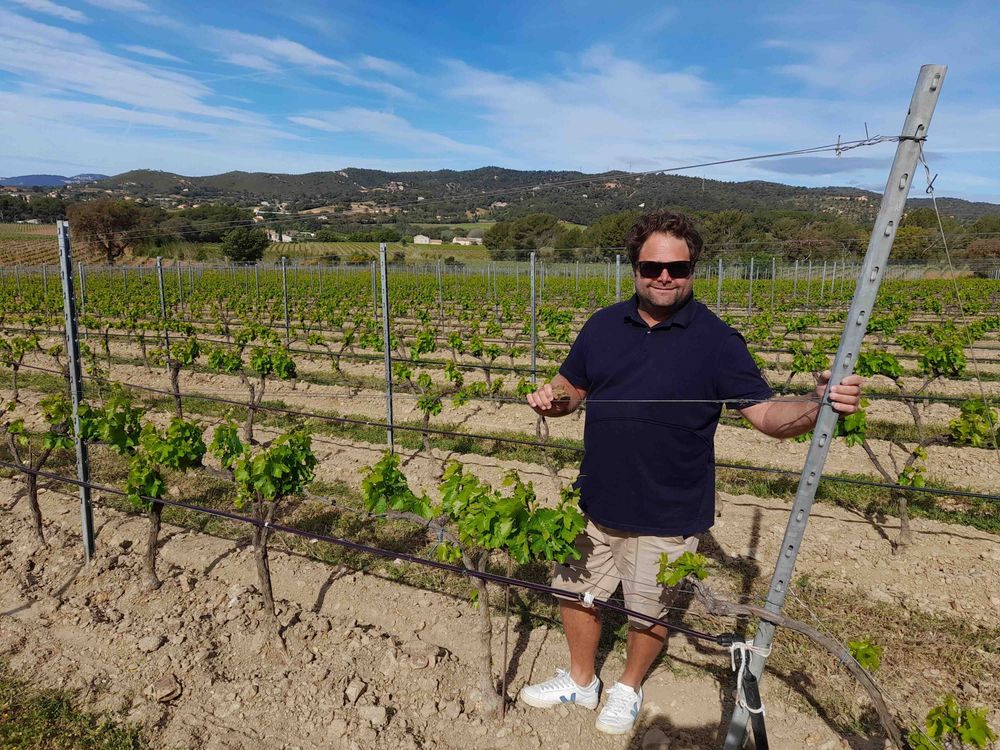
Organic since 2003 – Enzo Fayard in one of the Château Sainte Marguerite vineyards
Enzo Fayard, who is no less charismatic than his brother, talks with the same enthusiasm.
“We try to keep very fruity wine – that’s our first motivation as it’s very important to our family,” he said. “My father had 45 years experience, and we have had 25.”
His father, Jean-Pierre, who Olivier jokes has moved on from the vineyards to the local golf course, bought the estate in 1977. That same year the winery was granted Côtes de Provence Cru Classé status, one of only 18 today. Some of the vines were actually planted as far back as 1936. The varietals grown are Grenache, Mourvèdre, Syrah, Cinsault, Carignan, Cabernet Sauvignon, Rolle and Semillon.
Both Rosé labels are majority Grenache, with the Symphonie 2022 containing a third Cinsault and the Fantastique 2022 around 20% of the white grape Rolle (aka Vermentino). While the former wine is a creamy pale pink, the latter is markedly pale with only a hint of pink. “It’s the future style of Rosé,” Olivier declared of the Fantastique. “We aim for this ‘peau de pêche’ colour each time,” Enzo added. That translates as ‘peach skin.’
Gratifyingly, both Rosés appear light on thiols, the chemicals that in excess give off aromas of grapefruit, grassiness or boxwood. Entry level Provencal Rosés can be either camouflaged or overpowered by these smells. Judicious amounts of thiols can add lemon freshness and some fruitiness – qualities that both Château Sainte Marguerite Rosés possess. Neither need any acid addition, like all the estate’s wines.
While both Roses saw no oak, the white Symphonie 2022, composed of 100% Rolle, was fermented in barrel and then received 50% new oak for élevage, with 50% second fill. “Rolle likes oak so much it could absorb 100%,” Enzo mused. If 50% sounds unusually high, the white coped with it comfortably, helped by very light toasting. In no way did it taste over-oaked.
Climate, harvest dates and mechanisation
On the subject of global warming, Enzo was unfazed, stating that it would not persuade him to consider changing varietals planted.
“Just change the rootstock,” was his verdict. “If the alcohol levels get too high, just change the date of harvest. We start harvest for the Rolle around 15 August – that has not changed in the last 10 years. The Grenache we pick by the end of August, and the Syrah at the beginning or middle of September. The Mistral which blows every day of every month apart from three or four days, even in July and August, is very beneficial, and especially important for organic farming.”
The vines are harvested mechanically. “We can pick in the night when it is cool, and the machine doesn’t forget any grapes,” Enzo said. “We have our own machine and our own driver, which is important.” He added that finding pickers has become increasingly difficult, with only foreigners willing to do it. Not that that has hampered the redoubtable Fayards in their ceaseless quest for quality.
So how were the latest Château Sainte Marguerite wines tasting?
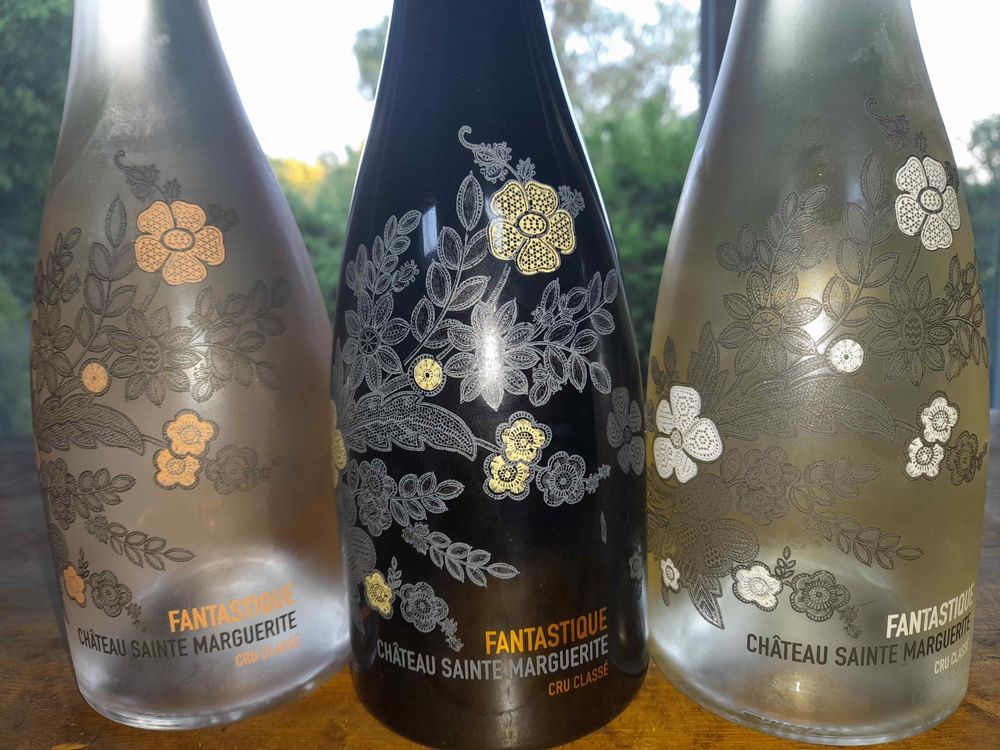
Château Sainte Marguerite Fantastique 2022, Cru Classé AOP Côtes de Provence Rosé, 13% abv
Blend of Grenache, Cinsault and Rolle with estate fruit only. Pale pink. Aromas of white peach, raspberry and plum with hints of guava and papaya. On the palate, delicate citrus fruit and rose petal notes with pear from the Rolle. Elegance and very good length.
Château Sainte Marguerite Fantastique 2022, Cru Classé AOP Côtes de Provence Blanc, 13.5% abv
100% Rolle from parcels in La Londe; barrel-fermented to give more complexity. Generosity and structure from élevage in 50% new oak and 50% second fill. Citrus, apricot and pear on the nose, with lemon notes on the palate with hints of honey, toast and vanilla.
Château Sainte Marguerite Fantastique 2021, Cru Classé AOP Côtes de Provence Rouge, 13.5% abv
Shiraz (60%) and Grenache (40%) from La Londe sites. 18 months élevage in 50% new oak and 50% second fill. Garnet/purple colour with deeply-scented black fruit, pepper and herbs. Silky tannins with notes of chocolate, morello cherry and juicy cassis.
Château Sainte Marguerite Symphonie 2022, Cru Classé AOP Côtes de Provence Rosé, 12.5% abv
Blend of Grenache, Cinsault, Rolle and Syrah. Some fruit bought from growers. As pale as a Rosé can get. Creamy peach and apricot aromas preserved by three-week fermentation at 14-15°C. Notes of peach, orange peel and exotic fruits. Freshness and finesse. Vegan-certified like all the wines.
The wines of Château Sainte Marguerite are imported and sold in the UK by Enotria&Coe which is a commercial partner of The Buyer. To discover more about them click here.
